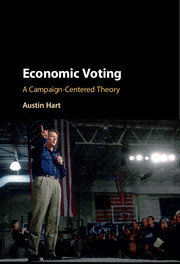Book contents
- Frontmatter
- Dedication
- Contents
- List of Figures
- List of Tables
- Acknowledgments
- 1 The Economic Voting Puzzle
- 2 A Campaign-Centered Theory of Economic Voting
- 3 Can Ads Prime the Economy? How Would We Know? US 1992
- 4 The Impact of a Surge in Economic Messages: Mexico 2006
- 5 The Absent Economic Message: US and Mexico 2000
- 6 The Campaign-Centered Model in Comparative Perspective
- 7 Conclusion
- Appendix
- References
- Index
1 - The Economic Voting Puzzle
Published online by Cambridge University Press: 05 September 2016
- Frontmatter
- Dedication
- Contents
- List of Figures
- List of Tables
- Acknowledgments
- 1 The Economic Voting Puzzle
- 2 A Campaign-Centered Theory of Economic Voting
- 3 Can Ads Prime the Economy? How Would We Know? US 1992
- 4 The Impact of a Surge in Economic Messages: Mexico 2006
- 5 The Absent Economic Message: US and Mexico 2000
- 6 The Campaign-Centered Model in Comparative Perspective
- 7 Conclusion
- Appendix
- References
- Index
Summary
[T]he economic voting paradigm has come to rival other political behavior models – party identification, social cleavages, and issue voting … [I]t appears a worthy adversary.
– Lewis-Beck and Stegmaier (2007)Retrospective economic voting is as close to a “law” of political behavior as exists in the social sciences. Over the last five decades, this thesis has been poked and prodded, analyzed and reanalyzed, challenged and refined. Yet the simple notion that economic context drives election outcomes remains a cornerstone in the study of political behavior. Quite simply, economic voting theory argues that citizens hold elected officials accountable for national economic performance – using their votes to reward incumbents in good economic times and punish them amid economic downturns. Even in light of the power of party identification, policy preferences, or social cleavages, and regardless of what candidates do or say during the campaign, macroeconomic forces move individual vote choices. Consequently, the nation's recent economic performance drives election outcomes. Empirical evidence of this economic voting relationship is in no short supply. Even outside of academia, the belief that incumbent-party candidates win elections when times are good and lose when times are tough is conventional wisdom. Economic voting, it would seem, is ubiquitous.
Yet, despite the near-axiomatic status of retrospective economic voting, electoral outcomes often defy the predictions of conventional theory. In perhaps the most infamous failure of the economic voting logic, a panel of top election forecasters convened at the 2000 annual meeting of the American Political Science Association to deliver their prognostications for the US presidential election just 70 days away. Armed with time-tested models of voting behavior and sophisticated econometric techniques, these experts unanimously predicted a victory for Al Gore. Although the polls had the race in a dead heat, economic voting theory held that voters would eventually cast their ballot for the Democrat as a reward for the unprecedented prosperity enjoyed under President Clinton. Banking on this conventional wisdom, the central question for the forecasters was not whether Gore would win, but rather by how much. While the consensus was that George W. Bush would lose by almost six points, the challenger overcame an extremely unfavorable economic context and won.
- Type
- Chapter
- Information
- Economic VotingA Campaign-Centered Theory, pp. 1 - 27Publisher: Cambridge University PressPrint publication year: 2016

